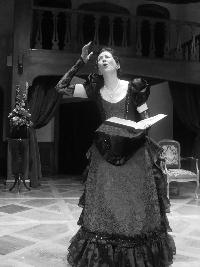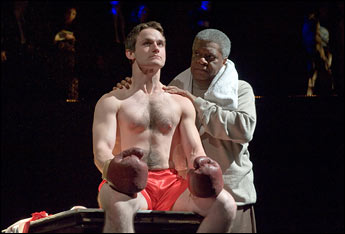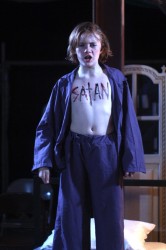|
Jacqueline Lawton: What was the first play that you ever directed? What did you learn from that experience that remains with you today?
Lee Mikeska Gardner: My first directing experience was play I wrote in the 6th grade. I had run through the 6th grade English curriculum (thanks to an ex-English teacher mother) and my teacher needed to keep me occupied, so for extra credit I wrote a play about Japanese culture, a subject we were studying, and directed it. It starred my best friend, Diane Webb. There was a lot of bowing. Much to the disappointment of my ex-English teacher mother, I gave up writing soon thereafter and began my theatre adventures. I was 12. I never looked back. I had a great Jr. high/high school program, and later college program that gave me the fundamental skills and honed qualities I use to this day, including tenacity bordering on mule-stubbornness. I worked very hard for my accomplishments - the years when I desperately wanted to act and had braces that gave me “peanut butter mouth” were a special kind of torture. But there was always something to do to keep me engaged. Throughout high school and college I assumed I‘d go into acting and stage managing - I never thought of directing. In both settings wise teachers saw something in me and casually suggested I direct this or that or take a class in directing. But I didn’t consider myself a director until I co-directed Fat Men in Skirts with Howard Shalwitz at Woolly Mammoth. Until then, I was an actor who filled in as a director when none could be found. My interest was in making the actors look good. I was a happy with black cubes and furniture borrowed from my house. I directed (and and acted) for many years at the original Source Festival and went on to form Vest Pocket Theatre Company, which survived a couple of years before I realized how little I really knew about running a theatre company. With Fat Men, I worked side by side with Howard, for whom I had assistant directed on a couple of shows, and began what I consider my M.F.A. in directing. I was on the 10 year program, about how long I was an Associate Artist at Woolly Mammoth. I took my fundamental passion for a good yarn, learned craft and began to articulate my aesthetic. After that show I just kept working as a director and haven’t really stopped. Directing comes easily to me: acting is much harder - all my degrees and formal training are in acting. But I could never do one without the other. JL: Why did you decide to get into theatre? Was there someone or a particular show that inspired you? LMG: I went into theatre to escape a home life filled with mental and physical illness. My parents couldn’t catch a break and as much as they loved their children, they were uncommunicative and dysfunctional and even at 12, I intuitively knew I had to find a way out of that daily tension. My story of 6th grade playmaking is true - it’s how I was introduced to theatre - but the events at home compelled me to take full advantage of the escapist aspects of theatre and for a long time fueled my work. My parents inspired me, in an anti-role model way. Because each of them were not allowed to pursue what they really dreamed of doing (astronomy, medicine) they were not about to tell their children they couldn‘t do something. But they weren‘t thrilled with the idea of theatre and they made me work for it. As I watched them succumb to illness in my early 20’s the equation, to me, equaled “don‘t do what you love, live unhappily and die early.” Because of my parents, and my rocky home life, I had something to say as a director at a very early age - I didn’t struggle to find my voice and exploring the fundamental human condition of sorrow will always be of primary interest to me. Theatre is in my bones. While I write about directing in this forum, I speak of theatre as a Theatre-maker. I have settled in to acting and directing, with some teaching thrown in, but I’ve worked at every aspect of theatre-making at some point. I’m not always good at it, whatever it may be, but I’m capable, and I possess an intuitive and relentless need to learn. I have tried several times to quit - to find an easier way to make a living and have a life - but I come back to it. Or it comes back to me. Making theatre is active. It satisfies my intellect, my hands, my need for challenges, my social needs, my need for expression, my undiagnosed A.D.D. and my desire to have an impact on people, in a way that no other profession does. JL: What kind of work do you do to pay the bills? How do you balance this work with your work as a director? LMG: Balancing the financial issues is easy. Balancing the quality of life choices is so individual. I’ve had all manner of jobs to supplement my theatre work when needed. For a long time I was an Executive Secretary to an attorney until I decided to make a go of living off my theatre income and turned over the job to a favorite stage manager. I’ve temped, I’ve worked retail, I’ve had two disastrous stints as a personal assistant, I went into theatre management, I went to grad school and lived off student loans… A condition of every job was that I was allowed to take the time I needed to do theatre. I sacrificed benefits and insurance, often, for time and a decent hourly wage. As I get older, I have a vague fear of never being able to quit working - but then, I don’t really want to. I knew from the time I was 12 I would have this kind of life and realized at about 18 what that meant financially. Facing my parents’ mortality drove me to a “live for the moment” philosophy rather than a “save for the future” philosophy. Facing my son’s future, I’ve started to balance those scales a bit. JL: In DC, we have the Capital Fringe Festival, the Intersections Festival, the Source Festival, the Kennedy Center's Page-to-Stage Festival, the Black Theater Festival, and the Hip Hop Theatre Festival. We also have the Mead Lab at Flashpoint Theater Lab Program. Have you participated in any of these? If so, can you speak about your experience? LMG: I’ve done a few things with these entities, but they’ve never been central to my work. Others can speak more intelligently on this topic. JL: How many plays have you directed in the DC area? How many of them were written by women? By playwrights of color? How conscious are you selecting plays by women or people of color when deciding your season? LMG: Including workshops, readings and academic theatre, I’ve directed over 70 productions. About half of them were plays written by women. Only one or two of them have been by playwrights of color, as a white woman director, I’m not seriously considered for plays written by POC. I don’t like being labeled as a “white woman director” so I don’t label the work of others. It doesn’t mean I’m not aware of the disparity of white men and everyone else - it means that when I’m offered a good play, I do it, regardless of by whom it’s written. JL: How do you feel the DC theatre community has addressed the issues of race and gender parity? How has this particular issue impacted you and your ability to work? LMG: The theatre community is highly aware of the lack of diversity in theater programming and has been for 20 years. The idea of racial parity first hit D.C. two decades ago when it became clear how absurd a city that had a majority black population had no black theatre or that other theatre’s weren’t giving black artists a place at the table. Theatres began mindfully to program plays by writers of color and start “color-blind” casting. I actually lost roles due to this policy and was not hired to direct “black” plays because I wasn’t. The idea of gender parity didn’t even occur to me until I was hired for a show because someone was looking for a “woman” director. I recently was talking to a director who had relocated from NYC and she was telling me about a job she didn’t get because she was no longer a NY director. She was saying (and I’m paraphrasing) it drove her crazy “because I’m a --” and I inserted “good director.” She said “… New York director. I still consider myself a NY director.” The fact is, we all have biases and we all have to work at getting our work done. Another fact is, white men, as a general rule, find it easier to do. The issue is - always - public support and funding. The several theatre companies that arose to address the lack of representation by woman, people of color, and the GLBT community didn’t survive, leaving it up to the theatres run primarily by white guys to take up the slack. Really!? Now keep in mind, it was white guys who gave me every break since high school along my career path. I got nothing against the white guys. There is no question that there is a need for mindful programming representing the community and world in which we live, regardless of who is making those decisions. But the audiences need to be there, the funders need to be there, the artists need to be up to the task, to make it stick. Making theatre with a diverse group of artists is not the problem. Getting people to the theatre is the issue because baseline reality - theatre is a business, not a social service. If we want more representation, we have to make a lot more noise and be prepared to self-produce and, ultimately, find the audiences who want to support us. JL: If you could be direct at any theatre in DC, which would it be and why? LMG: I like to work at theatres that do interesting work and whose Artistic Directors have good minds. Forum, Constellation, Rorschach, are a few theatres on my list that I haven’t tapped into yet. JL: DC audiences are ... LMG: Intelligent, passionate, adventurous, supportive and still too small. JL: DC actors and designers are ... LMG: Creative, committed, professional, smart, bold, willing, alive, eager, the best. JL: DC playwrights are ... LMG: Under-recognized, although I think that’s changing. I think with the advent of locavore theatre more new work is getting produced at different levels and that can only benefit everyone. A playwright can’t get better at what they do unless they get to do what they do and that means productions. D.C is good at importing talent - I’d like to see more export, too - which means I’d like to see more theatres take risks, which means I’d like to see more audiences supporting theatre, which means funders have to pay attention, which is another conversation altogether. JL: DC critics are ... LMG: Not in love with theatre any more. At the least the ones at the major print publications. I feel the love from the on-line media sources and I go to them first these days, but I also wince at a lot of amateurish writing. I am being quite blunt - but I have been known to write to a critic about a badly written or unfair review, so this should be no surprise to any of them. And let me get on a soap box now. I don’t like that one person (or a handful) has the opportunity to dictate the success of a production. It’s bad business. Any artist who thinks challenging a review is “sour grapes” and therefore won’t, is allowing other people to define the art form. I won’t ever challenge someone’s subjective reaction to the work, but I don’t take bad or lazy writing or a limited view-point quietly. I usually write privately to the critic because I’m challenging his or her skill or focus - but every now and then I’ll do it publicly because I want the give and take of other viewpoints. Ultimately, the role of the critic these days has been reduced to a piece of a marketing plan. Good reviews - Plan A. Bad or mixed reviews - Plan B. And what I want, as an artist, is public and private conversation. I don’t do my work in a bubble - I do it to challenge myself and challenge/entertain others and I never mind a little thoughtful pushback. It’s one of the ways I learn. I want the reviewers to work as hard as I do to get better at what I do to get better at what they do. JL: What advice do you have for an up and coming DC based director or a director who has just moved to D.C.? LMG: I became a director by accident during a time of growth and my direct experience is atypical. But I know what I was looking for when I was running theatre companies and hiring artists. Take the time to see theatre. Check out big and small companied. Identify the kind of work or style you are drawn to - not that you have to be boxed in by that, but with 80+ working theatres, you can’t hope to network with all of them at the same time. Send out your materials. Know how to talk about yourself and what you like to do. Expect slow going, but be tenacious. Work the Fringe, the Source, the Festivals, The Actors’ Center. Let people know what you are doing. A director with a background like Eleanor Holdridge’s will find a place quickly, but up and coming directors will have to be focused and patient and ready to make theatre. To all artists who are struggling to find their place in any city - know what else you love to do and do it. An unhappy theatre artist presents a tense, unhappy person that is hard to hire. Know that you probably won’t work steadily for awhile and find joy in other parts of your life that will feed the theatre work when it does come. And have faith in two things. 1. There is no expiration date on how long you can work if you choose. You can come and go as your life dictates and while there may be hard choices, you don’t have to sacrifice family or friends to find success. 2. Your life will feed your art. Someone who’s life is wrapped around theatre only becomes a dull artist. With no world view or outside interests you have very little to talk about on stage. JL: What's next for you as a director? Where can we keep up with your work? LMG: First, I’m playing Mrs. Fisher in a 1924 play called The Show Off by George Kelly at The American Century Theatre. Then I’m directing The 25th Annual Putnam County Spelling Bee with the Washington Savoyards in March, a new Allyson Currin play, Caesar and Dada in May at WSC Avant Bard and Blythe Spirit at 1st Stage. After that, it’s a mystery.
0 Comments
Your comment will be posted after it is approved.
Leave a Reply. |
My BlogI'm a playwright, dramaturg, and teaching artist. It is here where you'll find my queries and musings on life, theater and the world. My posts advocate for diversity, inclusion, and equity in the American Theatre and updates on my own work. Please enjoy!
Categories
All
Archives
June 2020
Reading List
|



